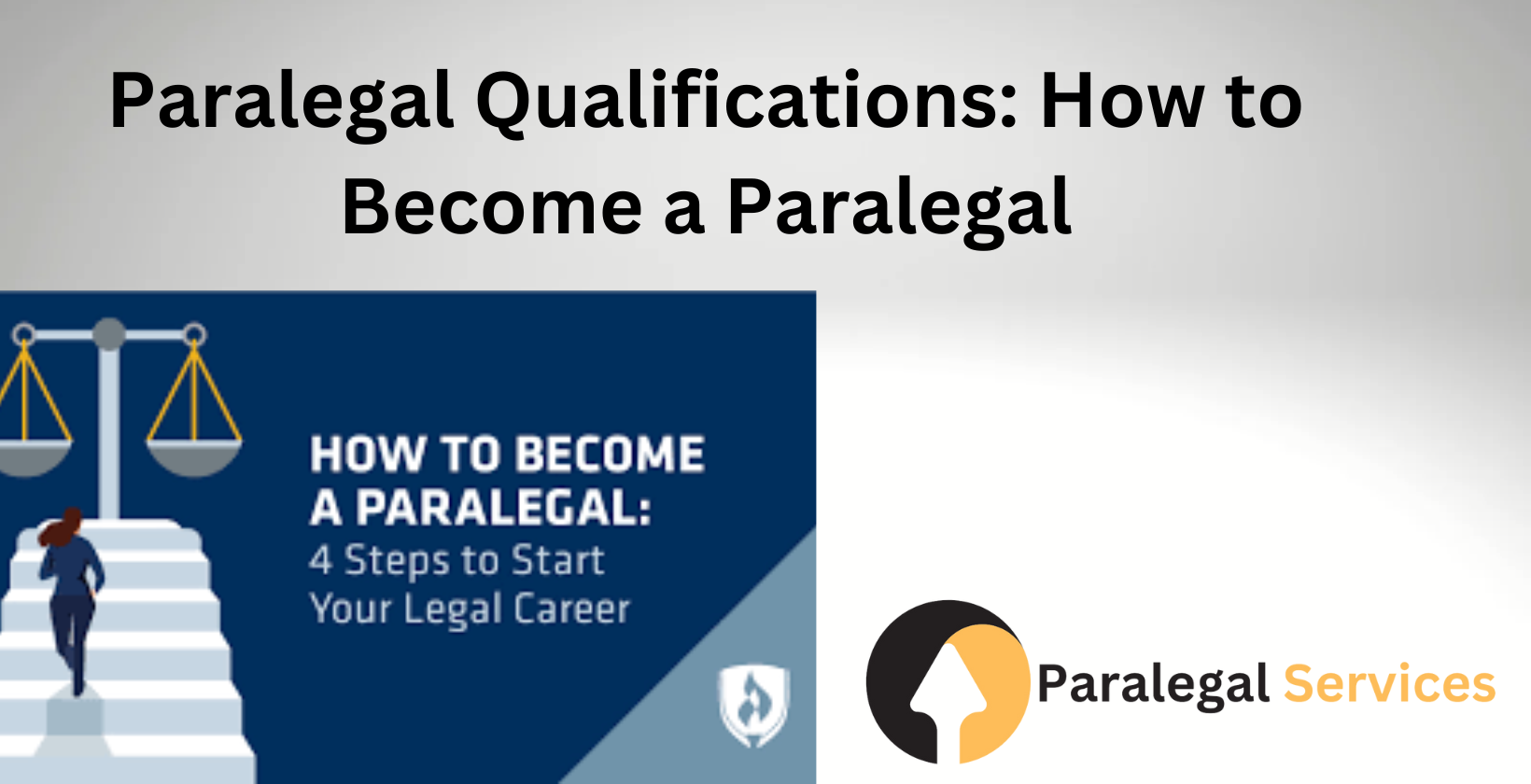Paralegal qualifications refer to the educational, training, and skill requirements needed to become a professional paralegal. Paralegals support attorneys in legal research, document preparation, and case management, playing a crucial role in the legal system. To become a paralegal, individuals typically pursue relevant education, such as an associate or bachelor’s degree in paralegal studies, and obtain certifications to enhance employability. Additionally, developing practical skills like legal writing, critical thinking, and communication is essential for success in the field. Understanding the pathway to becoming a paralegal helps aspiring professionals navigate their career journey effectively.
What Are the Qualifications to Be a Paralegal
The qualifications to be a paralegal include educational achievements, skill development, and certifications that enable individuals to support legal professionals effectively. Below is a detailed list and explanation:
- Educational Qualifications
- Associate Degree in Paralegal Studies: An associate degree provides foundational knowledge in legal terminology, legal writing, and research.
- Bachelor’s Degree in Paralegal Studies or a Related Field: A bachelor’s degree offers a more comprehensive education, covering advanced legal concepts and specialized areas of law.
- Certificate Programs: Post-degree certificates are designed for individuals who already hold a degree in another field and wish to specialize in paralegal studies.
- Certifications
- Certified Paralegal (CP) Credential: Offered by the National Association of Legal Assistants (NALA), this certification demonstrates professional competence.
- Advanced Certifications: Specializations in fields like corporate law or litigation increase employability and expertise.
- Skills Development
- Legal Research and Writing: Proficiency in finding legal precedents and drafting documents is essential.
- Communication Skills: Paralegals must communicate effectively with attorneys, clients, and court personnel.
- Organizational Skills: Managing large volumes of documents and deadlines requires strong organizational abilities.
- Experience Through Internships
- Practical experience gained through internships in law firms or corporate legal departments is valuable for skill application and networking.
What Are the Steps to Becoming a Paralegal
To become a paralegal, follow these steps:
- Obtain a Relevant Education
The first step is earning an associate or bachelor’s degree in paralegal studies or completing a certificate program for those with a degree in another field.
- Gain Practical Experience
Participation in internships or entry-level roles provides hands-on training in legal environments, helping to develop skills in research, writing, and case management.
- Develop Key Skills
Build expertise in legal writing, document organization, research methodologies, and technology tools used in the legal field, such as case management software.
- Earn Paralegal Certification
Obtain certifications like the Certified Paralegal (CP) or Advanced Certified Paralegal (ACP) to demonstrate professional competency and specialization.
- Seek Employment in a Legal Setting
Apply for roles in law firms, government agencies, or corporate legal departments. Networking and maintaining a professional resume are important at this stage.
- Pursue Continuing Education
Stay updated on legal developments by attending workshops, earning advanced certifications, or pursuing higher education in specialized areas of law.
What Degree Do You Need to Be a Paralegal
To become a paralegal, several degree options are available based on the educational path chosen. Below are the degrees and their explanations:
- Associate Degree in Paralegal Studies
- This degree typically takes two years to complete and provides foundational knowledge in areas such as legal writing, research, and basic law.
- It is an ideal option for those looking to enter the workforce quickly and start a career in a legal environment.
- Bachelor’s Degree in Paralegal Studies or a Related Field
- A bachelor’s degree usually takes four years to complete and offers a more comprehensive education, including specialized legal topics and advanced skills.
- This degree is preferred by many employers and provides broader career opportunities.
- Post-Baccalaureate Certificate in Paralegal Studies
- For individuals with a degree in another field, a post-baccalaureate certificate offers focused training in paralegal studies.
- These programs typically take one year or less and equip candidates with the necessary skills for paralegal work.
- Master’s Degree in Legal Studies or Paralegal Studies (Optional)
- Though not required, a master’s degree provides in-depth knowledge and specialization for advanced roles in the legal field.
- It is an option for experienced paralegals looking to advance their careers.
How Many Years Does It Take to Become a Paralegal
The number of years it takes to become a paralegal depends on the chosen educational path and career preparation steps:
- Associate Degree Path
- Completing an associate degree takes approximately 2 years.
- Adding an internship or entry-level job may extend this timeframe slightly.
- Bachelor’s Degree Path
- Earning a bachelor’s degree takes about 4 years.
- This option provides more extensive education and potential career advancement.
- Certificate Program for Degree Holders
- For those who already hold a degree, completing a certificate program in paralegal studies can take 6 months to 1 year.
- Overall Time Including Experience
- Combining education and initial work experience, it typically takes 2 to 4 years to become a competent, employable paralegal.
For example, completing a two-year associate degree and securing an entry-level role could position someone as a working paralegal within three years. A bachelor’s degree path, with internships included, might take about five years.
What Experience Do You Need to Be a Paralegal
To be a paralegal, certain types of experience are essential to develop the skills and knowledge needed for the role. Below is a list of relevant experiences:
- Internships in Legal Settings
- Gaining hands-on experience through internships at law firms, corporate legal departments, or government agencies is critical.
- Internships help develop practical skills such as legal research, drafting documents, and case management.
- Entry-Level Legal Roles
- Working as a legal assistant, file clerk, or administrative assistant in a law office provides exposure to legal processes and workplace dynamics.
- Case Management Experience
- Experience managing case files, organizing legal documents, and maintaining deadlines demonstrates reliability and efficiency.
- Technology Skills Experience
- Familiarity with legal software, document management systems, and research databases like LexisNexis or Westlaw is essential.
- Gaining experience with these tools can occur through internships or previous roles in legal environments.
- Client Communication Experience
- Roles involving direct interaction with clients help develop the communication and interpersonal skills needed to liaise between clients and attorneys.
- Pro Bono or Volunteer Legal Work
- Participating in volunteer opportunities or pro bono projects at legal aid organizations provides valuable exposure to legal work and demonstrates commitment to the field.
What Does a Paralegal Do
A paralegal performs various tasks to support attorneys and the legal team. Paralegals play a vital role in ensuring efficient case preparation and legal operations by conducting research, preparing documents, and maintaining communication.
What Are the Duties of a Paralegal
Below is a list of the duties of a paralegal:
- Legal Research
- Conducting research to find case precedents, laws, and legal interpretations relevant to ongoing cases.
- Drafting Legal Documents
- Preparing contracts, pleadings, affidavits, and other legal documents under attorney supervision.
- Case Management
- Organizing case files, tracking deadlines, and managing case-related correspondence.
- Assisting in Trial Preparation
- Compiling evidence, preparing exhibits, and coordinating witness interviews.
- Client Communication
- Acting as a point of contact for clients, answering basic inquiries, and providing updates on case progress.
- Administrative Support
- Performing administrative tasks such as scheduling meetings, managing calendars, and maintaining document filing systems.
- Court Filing and Document Submission
- Filing legal documents with courts and ensuring compliance with procedural requirements.
- Specialized Legal Assistance
- Supporting attorneys in specialized areas of law, such as corporate law, family law, or intellectual property law.
For example, a paralegal in a family law firm might prepare custody agreements, while a corporate law paralegal may assist with mergers and acquisitions paperwork.
Meet the Author
Annette E. – Distinguished Paralegal at BestParalegalServices
Annette E. is a distinguished paralegal at BestParalegalServices with comprehensive expertise in supporting solo practitioners and small law firms across diverse legal areas, including contract law, family law, and real estate. She specializes in preparing essential legal documents such as contracts, legal briefs, discovery documents, and client correspondence, ensuring each one meets stringent legal requirements and aligns with both state and federal regulations.
Annette brings over five years of paralegal experience, including extensive litigation support as a law clerk. This background gives her a unique insight into the intricacies of legal proceedings, allowing her to provide exceptional service and attention to detail.
With a Bachelor’s degree in Legal Studies and a certification in paralegal studies, Annette is a trusted professional for attorneys seeking reliable and thorough legal support. Her experience and dedication make her a valuable asset for clients and attorneys alike.



